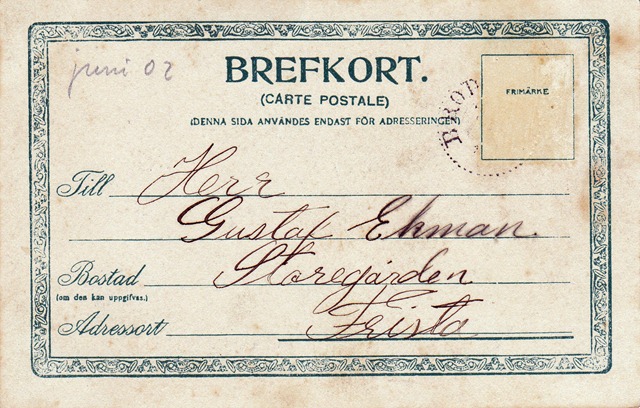No. 8. Upsala Universitet. Imp. F. W. H. & Co.
Uppsala University (Swedish: Uppsala universitet) is the oldest university in Sweden, founded in 1477. It is generally considered one of the most prestigious institutions of higher learning in Northern Europe. The first female students were admitted in the 1870s. There would not yet have been very many women there in 1902 (and it is unlikely that the card-writer was a university student at all).

To: Herr Gustaf Ekman, Storegården, Frista
Poststämpel oläsbar / Postmark illegible
Date: 24.6. 1902
From: A---A
Ekhaga Mjelldrunga den 24/6 1902
Tack för senast. Hur mår Gustaf. Hvad är det för roligt i Frista om midsommar, jag har ej någodt särskilt roligt. Kan hälsa från Grolanda, jag varit der nu om Söndag.
Hälsningar från A---A
Hälsa K.E. och G.E.
Mjäldrunga socken sydväst om Falköping i Västergötland ingick i Gäsene härad och tillhör numera Herrljunga kommun. Grolanda socken gränsar till Mjäldrunga och Floby, och ingår nu i Falköpings kommun.
Avsändaren skriver från Mjelldrunga (Mjäldrunga), och är därför troligen någon som Gustaf känner från sina vistelser hos syskonen i Odensberg och Floby. Jag tror inte det är samma avsändare som kortet G.008-2, även om initialerna är desamma – detta utifrån stavning och handstil. Bl.a. skriver hon/han ortsnamnet “Frista” utan –d på slutet, dvs en uttals-enlig stavning. Själva vykortet ingår antagligen i en serie med vyer från hela landet och betyder troligen inte att avsändaren själv varit i Uppsala.
Hälsningarna till K.E. och G.E. är troligen till Carl (Karl) och Gerda. Även om Gerda mestadels under 1901-02 tycks ha bott hos systern Emma i Floby, kan hon ju ha vistats på Storegården vid midsommartid.
In English
Ekhaga Mjelldrunga 24/6 1902
Thanks for last time.1 How are you. What’s going on in Fristad at midsummer, not much going on here [or: I’m not having much fun]. I have greetings from Grolanda, I was there on Sunday.
Greetings from A---A.
Give my greetings to K.E. and G.E.
1 ”Thanks for last time” is a very common polite phrase in Swedish which does not really have any equivalent in English. You say it or write it whenever you greet someone who was recently your host or hostess in some context, whether you were a guest in their home, or they invited you out to a restaurant etc.
This card like the previous one was written by someone with the initials AA, but judging by handwriting, spelling and postmark I don’t think it’s the same person. For one thing, this writer spells the name of Gustaf’s home village as it is pronounced locally, rather than the official spelling (Frista’ instead of Fristad).
The view on the card is from the University of Uppsala, north of Stockholm, but it was probably one in a series of cards from various places, and the sender may have bought it elsewhere. It was sent from the countryside near Falköping in Västergötland, the same area where two of Gustaf’s older siblings lived. My guess is that he got to know the sender of the card (probably a girl?) while staying with his brother Oscar at Odensberg, or visiting his sister Emma at Floby.
The writer sends greetings to K.E. and G.E. who are probably Gustaf’s brother Karl (Carl) and his sister Gerda. Carl lived permanently at the farm Storegården; and while Gerda in 1901-02 seems to have stayed mostly with her older sister Emma and family at Floby, she may have been in Fristad for midsummer.


I have to tell you that although I have not been to Sweden, I am quite familiar with it through the Martin Beck books by Sjowall and Wahloo(I know the accents are missing, sorry.) I've read all of them, as well as most of the Wallander series. My husband and I are big lovers of foreign film as well, and we have seen our share of the Scandinavian films. I find your blog of great interest.
ReplyDeleteKat
It is certainly a facade in the grand tradition.
ReplyDeleteTillägg 2013-06-20:
ReplyDeleteHar rättat dateringen av kortet från 29/6 till 24/6 1902. Midsommar omnämns ju och firades på den tiden alltid 23-24/6, oavsett veckodag.
Av vykort G.017.3 framgår dessutom att Ester befann sig i Grolanda sommaren 1902, så det är troligen henne som avsändaren av det här kortet hälsat på.
I have corrected the date in the above post from 29/6 to 24/6 1902. Midsummer is mentioned and was back in those days always celebrated 23-24 June, no matter what day of the week.
DeleteFrom postcard G.017.3 I learn that Ester was at Grolanda that summer, so it was probably her that the sender of this card had visited there.